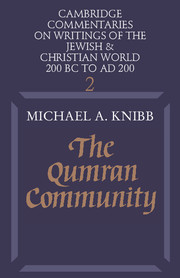Summary
This volume is intended to provide a representative selection of extracts from the Qumran sectarian literature under the three categories of legislative writings, poetic and liturgical writings, and exegetical writings. It has been thought more helpful to give substantial extracts from a limited number of works than to attempt to take account of everything.
The Qumran scrolls form only part of the Dead Sea scrolls, which – on the broad understanding given to this term – include the discoveries made at other sites in the vicinity of the Dead Sea, such as Murrabaʿat, Masada, or Naḥal Ḥever; but these latter discoveries are not our concern. The scrolls from Qumran themselves are by no means restricted to sectarian writings. It is important to bear in mind that manuscripts of the books of the Old Testament form a major part of the manuscripts found at Qumran. These biblical manuscripts, which include copies of every book in the Old Testament except Esther, are important for the history of the text of the Old Testament. Reference should also be made here to the manuscripts of books in the Apocrypha (Ecclesiasticus, Tobit, and a small Greek fragment of the Letter of Jeremiah). Another group of scrolls consists of manuscripts of apocryphal and pseudepigraphical works, such as Jubilees or the Ethiopic Book of Enoch, that were known before the discovery of the scrolls.
- Type
- Chapter
- Information
- The Qumran Community , pp. 1 - 12Publisher: Cambridge University PressPrint publication year: 1987



